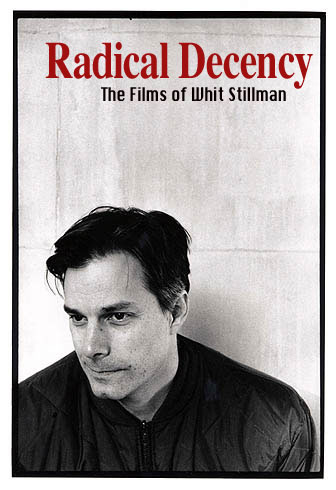
I am so tired of scumballs. Okay,
I don’t know a lot of scumballs, but they are everywhere in movies.
Take Mystic River. Or better yet, don’t.You may know the set-up.
A boy, one of three friends, is picked up and horribly abused. He grows up
to be a dysfunctional adult who may or may not have murdered the eldest daughter
of one of the other boys who happens to be a local crime boss. The third,
a cop, investigates.
Contrived? You bet, and that’s without even mentioning, for one thing,
the gratuitous slap at the Catholic Church. One of the men who kidnaps the
boy is only—and very conspicuously— identified by a crucifix encrusted
signet ring, though there is no indication he is a church officer, nor that
religion is of more than perfunctory importance to any of the characters,
and the topic is never raised again. But if it’s Boston and a child
is to be molested, who better for the job than a priest?
It’s a cheap shot, and sloppy, similar to the common movie phenomena
that only about half the actors seem to be interested in playing a regional
dialect. Of them, Laura Linney alone refuses to condescend to it. In fact,
you wonder why an actress with such obvious poise and ability bothered with
the nothing role until toward the end she breaks into a Lady Macbeth speech
which is pretty cool except it comes out of flippin’ nowhere. Her business
about how much her husband (played by Sean Penn) loves his remaining daughters
is somewhat undermined by the fact he hasn’t looked at or mentioned
them hardly at all in the previous two hours, and the idea that they as a
couple rule the neighborhood seems rather weak considering how utterly crappy
their circumstances are—and how similar to their peers’.
For most of the three or four hours of Mystic River’s running
time, Penn shrieks and bawls to indicate “sorrow” and pushes his
lips out really far to signal “cool.” Tim Robbins as the damaged
adult shuffles, bugs his eyes, and drones. Marcia Gay Harden as his doubting
wife shrinks and whines and makes her vowels the flattest in all of Baaasten.
In short, the three put on such a display of Acting that their Oscar nominations
(and wins for Penn and Robbins) were as inevitable as official recognition
the unforced, plausible work of Linney, Kevin Bacon (as the third childhood
friend) and Lawrence Fishbourne (as Bacon’s partner) was unlikely.
In the end, the characters return to the old neighborhood and watch a parade
go by. Likewise, Mystic River is ultimately stagnant; an unworthy
expression by driven, talented people about how the under classes teem with
misery and corruption, and even those who seem to have escaped are inevitably
drawn back into the maelstrom. It’s simply another example of how often
actors wallow to cover themselves with glory, and an Important Film is one
that makes you want to go home and scrub yourself with steel wool. (By the
way, everything about Mystic River goes double for multiple Oscar
nominee 21 Grams. The only relief in the movie is in snickering at
Benicio
del Toro’s hair job, which looked like someone dropped a bag of
flour on his head.)

John Waters at the Independent Spirit Awards
Then Waters hands the mic to the Independent Establishment and the next couple hours are given over to defensive groupthink. Every film is “daring,” every outlook “controversial,” every artist “original,” even though they are as uniform as the impeccably tousled hair on every presenter and recipient. They damn Hollywood as an incestuous nest of timidity and conformity, then invariably give their award to whichever nominee is also up for an Oscar. They second the opinions of the previous winners (especially if Michael Moore is one of them), and flatter the audience for having the courage to agree with them. It’s a scene where the most scandalous utterance imaginable would be, “You know, I think Christianity has been the most important organizing principle in the western world, and that the bourgeoisie have been more crucial to widespread liberty and social progress than any other phenomenon in history.” And it will never happen.
Unless, just maybe, Whit Stillman ever makes another movie and is invited to the party.
Stillman was born in 1952 to a Democratic politician and a former debutante in reduced circumstances. He went to Harvard, then worked in journalism, ran an advertising business, and had a job in sales and film distribution in Spain, all the while toying with literary pursuits. He finally rejected novel writing as too solitary an endeavor, and turned toward filmmaking. When nobody approached him with a script to direct, he ended up writing his own, Metropolitan, which earned him an Oscar nomination. He followed it three years later with Barcelona, and three years after that with The Last Days of Disco. The three films share actors and characters, and form an unofficial trilogy that extends from “Manhattan, Christmas Vacation, Not so long ago” through Barcelona in “the last decade of the cold war.”
Like Waters (!), Stillman focuses on an underrepresented and overly maligned segment of the American population. Though the former adores the no-class carnival of social outcasts and the latter chronicles the “young bourgeoisie in love,” they both treat their subjects with a generosity of spirit all too rare in film, mainstream, indy, art, and otherwise. But where Waters has achieved cache amongst the trendy (witness his hosting duties) for reveling in perversity, Stillman is radically decent. Where rancorousness and depravity are reflexively embraced as audacious in movies, it’s the striving for civility and propriety by Stillman’s characters that is revolutionary.
In Metropolitan, the mother of a young deb named Audrey Rouget comforts her daughter after her son made a crack about his sister’s posterior. The mother of Tom Townsend, the boy Audrey likes, loans him money for a second hand tux and makes soothing non-committal statements about her ex-husband’s concern for him. Aside from a glimpse of Audrey’s mom at a midnight mass, that’s the last time a parent is shown in a Stillman film. Metropolitan is set almost entirely in a series of after-parties held during the Christmas holidays. The parties last until “people go, or whenever the parents get up.” The arousal of parents in this context signify looming maturity, the end of good times, and the beginning of dire, even doomed adulthood. In The Last Days of Disco, parents are distant check providers. In Barcelona, they are entirely absent. Even when one of the characters is gravely hurt and when another marries, no parents or other family members fly to Spain to check in, and nobody thinks it’s amiss. The young characters — often children of broken homes, shuffled off to boarding schools and later colleges—look to literature, philosophy, and one another for moral guidance.
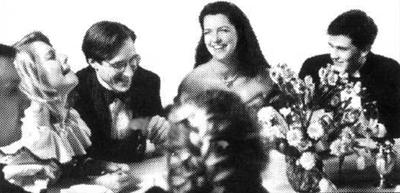
Metropolitan: Group Social Life
When Audrey tells Tom how much she enjoyed Jane Austin’s Mansfield
Park, he is dismissive of the plot twist that had the virtuous heroine
resisting participation in a play put on by her wealthy, and slightly decadent
relations. “In context, nearly everything Jane Austin wrote is near
ridiculous by today’s standards,” Tom tells Audrey. “Has
it occurred to you that today looked at from Jane Austin’s perspective
would look even worse?” she retorts. Audrey’s sensibilities are
informed by her love of literature (she fell for Tom over the letters he wrote
to her schoolmate Serena), and particularly by the example of Austin’s
heroines. She is more reserved and decorous than her peers. She refrains from
a round of strip poker (she and her friend Charlie play chess), and, like
Fanny Price in Mansfield Park protesting the play, warns against
a game of Truth. Excessive candor became taboo in society, she explains, because
previous generations knew how harmful it could be to harmonious relationships.
When she succumbs to group pressure to play anyway, Audrey is wounded when
Tom is asked to name his romantic interests and she doesn’t make the
list.
Austinesque propriety seems discredited as more tactless and unscrupulous
characters thrive. At a particularly low point for Audrey, she spies a scarred
set of Austin’s novels for sale at cut rates. Romantic rival Serena
offers mocking praise when she tells Audrey Tom described her as “well
read.” When Tom and Charlie worry that Audrey has fallen in with a scoundrel,
they cite her admiration for Austin as a sign of her innocence. But like an
Austin heroine, Audrey has formidable inner strength and an implacable sense
of self. The author and the character share the first two letters of their
names, and AU is also the symbol for pure gold. In the end, Audrey and the
two most upstanding bachelors in her circle, Tom and Charlie, embark on a
long journey at dawn, toward their parents’ houses.
Released in 1990, Metropolitan preceded, and perhaps foretold the rash of Austin adaptations that began with the suburb A&E version of Pride and Prejudice, continued with the excellent Clueless, the underrated Persuasion, the competent Sense and Sensibility and Emma, and bottomed out with the tarted-up indy version of Mansfield Park, and with Bridget Jones’s Diary, which re-imagined the heroine of Pride and Prejudice as a chunky, slutty dope obsessed with trivialities. Movies that extol the maintenance rather than the violation of social norms are simply not common, and movies that feature young women who are not just babe-a-licious but virtuous even less so. With the exception of Stillman’s projects, and, weirdly, the cheerleader movie Bring it On, the fad ended as soon as soon as Austin’s major novels were filmed.
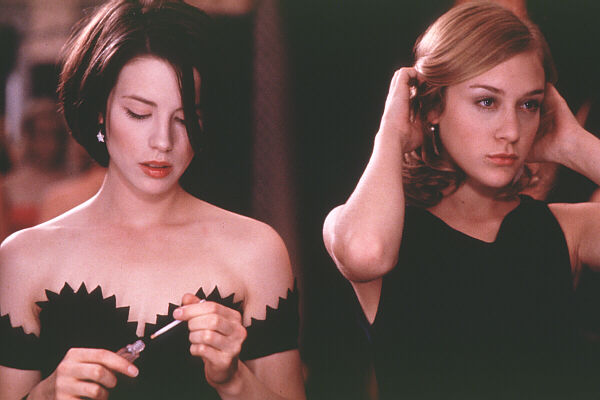
The Last Days of Disco: "In pysical terms, I'm cuter than you..."
Even Whit Stillman’s sensibilities darkened with his movie The Last Days of Disco, released in 1998. Though the most recent of his films, Disco is set before Barcelona, and several years after Metropolitan. In it, Audrey Rouget, in a bit appearance has become a legendary editor in the publishing firm where Alice and Charlotte land their first jobs. As in Metropolitan’s roundelay of after parties, a circle of young adults try to engage in group social life, free from “all the vicious pairing-off.” Alas, Charlotte, the main proponent of the idea, is awfully vicious herself. She admits early on to having sabotaged Alice’s social life at school, but still insists they would make a good team. “In physical terms, I’m cuter than you,” she tells Alice, “but you’re much nicer than I am.” Charlotte is the human embodiment of the Truth game from Metropolitan, a fearlessly candid social wrecking ball who gets away with it because she can also be engaging and fun, and did I mention pretty?
Alice is shy and defensive, uncertain in social settings. Eager to embark
on post-collegiate life, Alice takes Charlotte’s advice and seduces
Tom Platt, on whom she had a crush years before. “There’s
something sexy about Scrooge McDuck,” she purrs when she learns
he collects first edition comics and original drawings.
And then she doesn’t hear from him. Then Charlotte viciously pairs-off
with a guy she had disdained until he mentioned he liked Alice. Then Charlotte
deduces and announces Alice has a venereal disease while they are out
with friends at the hottest club in the city.
Even worse, Alice takes Charlotte’s advice about how VD can be an
excuse to reunite with former lovers, and how it can all be very sweet.
She calls Platt, and he lectures her about how he thought of her paragon
of virtue until she came on like a tramp. I mean, really, Scrooge McDuck
is sexy? She tells him that until that night she was technically
a virgin, and he apologizes for giving her not only G but H. H? Her eyes
widen, and she knows she’ll be getting sympathetic looks from pharmacists
for the rest of her life. This may seem like Stillman punishing a character
who failed to live up to her principles. After all in a similar situation
in Metropolitan, the indiscrete character Nick remarked, “It’s
not hypocrisy, it’s sin.” But there’s something more
to it.
Stillman’s movies reflect the tenets of American transcendentalism, the belief that humans can have direct access to God especially through nature and quiet reflection. As its most prominent proponent Ralph Waldo Emerson wrote, “The currents of the Universal Being circulate through me; I am part or parcel of God.” The characters in Stillman’s films who betray their ethical selves seem to suffer more because they have cultivated ethical selves to betray. Like Audrey feeling embarrassed during the game of Truth where her shameless friends were not, Alice’s infection seemed more significant than Charlotte’s and Platt’s because it was a token of a betrayal of her principles—which were in truth finer than theirs. The line between cultivating inner goodness/godliness and indulging egoism is a major theme in Stillman’s films.
The struggle is highly individual, though organized religion gets a respectful nod. A midnight mass is attended, and Martin Luther’s hymn “A Mighty Fortress is Our God” opens Metropolitan (though it quickly shifts to swing music). In The Last Days of Disco, a clinically depressed character quiets his mind with the words to an Episcopal hymn, “Dear Lord and Father of Mankind, forgive our foolish ways/ Reclothe us in our rightful mind, in purer lives they service find/ In deeper reverence, praise.” When Alice suggests this is odd, Charlotte, ever eager to one-up any one and any thing, busts into a rendition of the abolitionist hymn “Amazing Grace.”
The most idiosyncratic approach
to religion is Ted’s in Barcelona. Ted is essentially an extension
of Charlie from Metropolitan (played by the same actor, and vested
with the same mannerisms and basic opinions), who wrapped up his transcendentalist
theory that “the sensation of being silently listened to with total
comprehension represents our innate belief in a supreme being, [but] at some
point most of us lose that, after which it can only be regained by a conscious
act of faith.” Asked whether he experienced that, he replies, “No…but
I hope to someday.” Ted tries to make good on that hope.
Unhappy at how a good friendship had soured when it turned “carnal” without the benefit of true love, Ted vows to swear off pretty girls in hopes of returning to traditional morality. Physical attraction clouds the mind to more refined perceptions of soul, he believes, and even persuades his cousin Fred (who is to Nick in Metropolitan as Ted is to Charlie) on the merits of his argument by using examples of mutual friends and family members. To Ted, this “leads pretty directly to the Old Testament,” which he conceals within a copy of The Economist magazine, and reads whilst listening to “Pennsylvania 6-5000” and almost unconsciously dancing the Lindy-Hop. When Fred, with a pretty Spanish girl on his arm, catches him at it, he asks, “What’s this? Some strange Glenn Miller based religious ceremony?” “No,” says Ted, “Presbyterian.” When the girl wonders whether this is what Protestant churches look like, Fred says, “Pretty much.”

Barcelona: Another carnal situation
Well, maybe not. But Ted is certainly a seeker in a classic American tradition
which, when not a variant of Presbyterianism, is also manifested in ethical
business practices. “Like nearly everyone else,” he reflects,
“I had seen Arthur Miller’s play Death of a Salesman
and, as a youth, had the usual sneering, deprecating attitude toward business
and sales.” In college, however, he was inspired by a professor of business,
and discovered a worthy culture in the professional world. “Franklin,
Emerson, Carnegie, and Bettger were our philosophers, and thanks to the genius
of Carnegie’s theory of human relations, many customers also became
friends.” Ted is shown expounding on this theme to a rather bored looking
Spaniard and later to a patient co-worker, and in their disinterest Stillman
grounds Ted’s enthusiasm. Still, Ted perseveres. “In true sales,”
he explains, “you provide a real and constructive service [and] help
people make their lives more agreeable, or make companies more efficient,
and so create wonderful economies of scale from which everyone and the whole
economy benefit.”
This is a valid statement, but virtually unrepresented in movies where the
“sneering, deprecating attitude toward business” is de rigueur.
Far more typical representations of work include the despicable In the
Company of Men, Changing Lanes, and One Hour Photo—none
of which evinced any sympathy for working life, or any indication their creators
had ever held a nine-to-five type job (unlike Mike Judge, the writer-director
of Office Space, who clearly had a bead on the frustrations of working
life, but advocated ethical workplace behavior nonetheless).
The kinds of jobs Stillman’s
characters hold, their educational backgrounds, and their social class are
also typically reviled in modern film. After Charlie in Metropolitan
laments that their little group is almost certainly doomed to failure, or
at least disappointment in life, Tom remarks that a bunch of people losing
their class prerogatives wouldn’t be such a bad thing. Audrey protests,
“Those ‘people’ are everyone I know!” Though Stillman
is a self-described “natural born social-climber,” his willingness
to invest the “untitled aristocracy” with empathy and complexity
is yet another rarity.
The filmmaker to whom Stillman is most often compared is Woody Allen, and
it’s true they share some stylistic similarities. Allen also populates
his movies with highly educated talkers, and employs a relatively static camera.
But Stillman has a knack for writing about the upper crust from the inside,
free from Allen’s churlishness and culture vulture tendencies. Allen’s
movies, especially the later ones, seem almost designed to expose and punish
the character types Stillman celebrates (think Interiors, Husbands and
Wives, and Crimes and Misdemeanors). This is in part because
Allen equates moral seriousness with misery, and his own Intellectual Little
Tramp is the biggest wretch of all (though he still beds stunning WASP chicks
and they pronounce him fabulous).
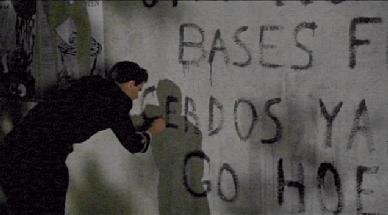
Barcelona:
Stillman advocates morality for its own sake, and is suspicious of equivocation. His movies are to hipster cinema what the American characters are to the European ones in Henry James’s novels—bumptious, honest, good-hearted, and constantly underestimated. Still, it’s not much of a surprise his movies are not more embraced. The concerns of the young overclass don’t have the populist appeal of scrappy outsiders, and Stillman’s characters realize it even if they don’t entirely comprehend the hostility. In Barcelona, Fred, a young naval officer, is scorned by street kids as “facha,” Spanish slang for “fascist.” He is alarmed, but Ted tells him not to take it so hard—shaving, short hair, neat dress—all facha. Naval uniform? Definitely facha. “Oh, then it’s a good thing!” Fred concludes; though after some reflection he decides, “They definitely didn’t mean facha in the positive sense.” Likewise, the little group in The Last Days of Disco are derided as “yuppies.” The character Des (the same actor who played Nick and Fred) says, “I wish we were yuppies. Young, upwardly mobile, professional—those are good things, not bad things.”
Stillman through his characters parses the attitudes, behaviors, and struggles of a tiny social segment with almost anthropological precision. The relative costs of Old Crow and Jim Beam, for instance, becomes a semi-important plot-point, and when a character announces he is a Fourierist all the others appreciate what that means.
In absence of severe financial worry or perceived physical threat (though anti-American terrorism plays a role in Barcelona), arguments over ideas become battlegrounds. Tom Townsend’s acceptance of (an into) a higher social class is signified by his renunciation of collective socialism (“I wouldn’t want to live on a farm with a bunch of other people,” Charlie concurs). In Disco, the unassuming Josh vies with the disreputable Des for Alice’s attention using Lady and the Tramp as a metaphor. “Essentially it’s a primer about love and marriage directed at very young people,” he says, “imprinting on their little psyches that smooth talking delinquents recently escaped from the local pound are a good match for nice girls in sheltered homes. When in ten years the icky human version of Tramp shows up around the house their hormones will be racing and no one will understand why. Films like this program women to adore jerks.” Fred’s critique of The Graduate in Barcelona is even more damning, and tonic to those of us who have found the former’s appeal elusive.
Where incessant and at times esoteric cultural references have been praised in movies written by Quentin Tarintino and Kevin Williamson (perhaps because they are punctuated by slaughter), Stillman’s have often been condemned as self-indulgent and rarefied. It’s certainly true that his movies have an unusually high density of conversation, but it wears well over repeated viewings (believe me) because it is so precise, so literary, and free of cliché. And it’s not all earnest young adults discussing philosophy and the arts and modes of goodness. There is a strong counter example in the Nick/ Fred/ Des character, who is not so much anti-intellectual as disinterested. For instance, a Spanish girl derides “…life in America with all of its crime, consumerism, and vulgarity. All those loud, badly dressed fat people watching their 80 channels of television and visiting shopping malls; a plastic, throw-away everything society with its notorious violence and racism and finally a total lack of culture.” Fred shrugs and says, “It’s a problem.”
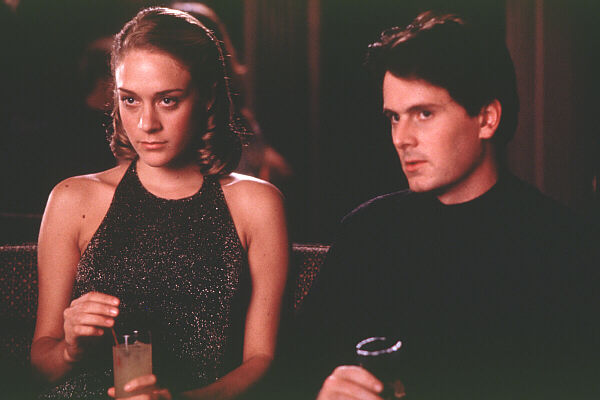
The Last Days of Disco: Lady and the Tramp
In Metropolitan, Nick is roundly and rightly accused of snobbery; but in fairness, he is also the most discerning. He insists Tom Townsend join the group because he is aware of the escort shortage and sympathetic to girls who are required to call the boys and put themselves on display. He also divines Tom’s compromised financial situation and advises him on how to maximize his means, then crushes Tom’s philosophical objections to deb parties by asking how him would feel about some much richer guy sitting at home worrying about how Tom can’t afford a proper overcoat. “Has it occurred to you that you are the less fortunate?” Nick asks.
Of all the characters in The Last Days of Disco, Des is arguably the most keenly aware of Alice’s essential goodness, and of Tom Platt’s hypocrisy and cruelty in denouncing her.
Chris Eigeman, the actor who portrayed Nick, Fred, and Des, has described himself as Whit Stillman’s evil alter-ego, the guy who says all the awful things Stillman would if he weren’t so polite. Stillman has described the characters and Eigeman as having the smarter, cooler, older guy affect he aspired to but could never pull off. Both characterizations are accurate. Nick/ Fred/ Des are the natural allies/ antagonists of the “bible-dancing-goodie-goodie” types embodied by Charlie/ Ted/ Josh. Tellingly, the Eigeman characters who trade in uncomfortable truths are finally undone by their own dishonesty. In Stillman world, though principled behavior isn’t the easiest path it is ultimately the most rewarding.

Barcelona: The Dance
Now for the disclaimer I should probably have put at the beginning: I do not have a philosophical problem with movies about confused, mean, petty, vicious, even evil people. Artists and the business structures behind them should always and forever be free to create and market as they see fit. The glorification of vice, however, has saturated the market to the extent that serial killer movies are unremarkable and nearly un-remarked upon, but a literal interpretation (taken from traditional sources) of The Passion of the Christ is condemned as a “snuff film” by film critics in major publications.
Whit Stillman’s movies are not to everybody’s taste. Of my friends familiar with his work, he is mostly known as “the guy you like, but who kind of bothers me.” But when it comes to a worldview which is vanishinly rare in contemporary American cinema (if not contemporary America itself), Stillman’s has the greater claim to originality and independence.
Since The Last Days of Disco, rumors have circulated about what his next project might be. The latest (though it’s also growing a beard) is an adaptation and combination of two novels Jane Austin left unfinished at her death. Though that would be an appropriate match, it would be a shame to miss a wholly original script and an American setting. Even if another Stillman film ever materializes, his contribution is unique and lasting, and if you have the inclination to see something genuinely novel, I hope you’ll keep Metropolitan, Barcelona, and The Last Days of Disco in mind.
(Written by Sharon C. McGovern)
Whit Stillman's entry in the Internet Movie Database
Stillmania! The Worldwide UHB
Barcelona Quote-O-Matic
Phil's Unofficial Whit Stillman Home Page